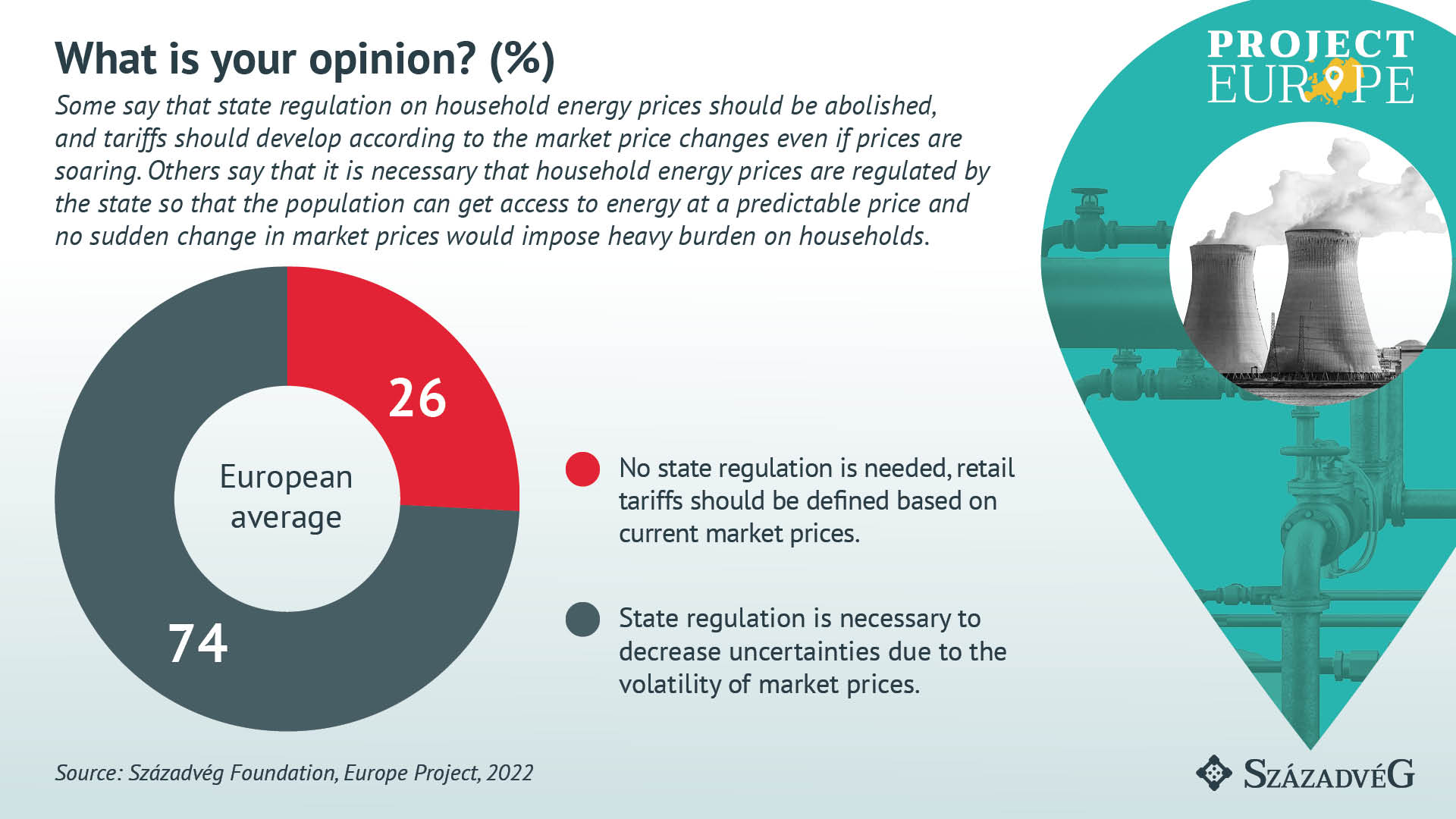In European countries where the state does not protect retail tariffs with an official safety net, rising market energy prices have spilled over into household overhead costs. In 2021, the price of household natural gas increased by more than 50 percent on average in the European Union, but there were significant differences between countries, based on their different regulatory environments. While, for example, Hungarian tariffs did not change due to the overhead cost reduction, the increase in Romanian household gas prices exceeded 200 percent. Századvég surveyed the population’s attitude towards energy prices in an opinion poll at European level just before the energy crisis and the outbreak of the Russian-Ukrainian armed conflict.
During the energy crisis, the attitude of Hungarians improved, while the pan-European attitude deteriorated
In the years before the outbreak of the energy crisis, an environment of rising household prices was characteristic of Europe, having a negative effect on citizens’ attitudes. According to the 2016 European Social Survey, 73 percent of Europeans feared that the price of energy could be too expensive for many people (in the respondent’s country). The proportion of respondents with a negative attitude in Hungary was also 73 percent. In the five years before the outbreak of the energy crisis, the whole of Europe was characterised by a deteriorating trend, while Hungary was characterised by an improving trend: based on the research by Századvég in 2021, the European rate increased to 78 percent and the Hungarian rate decreased to 68 percent.
In Hungary, however, retail tariffs did not even change as a result of the energy crisis, so the proportion of those who worried fell by one percent, despite the deteriorating macroeconomic environment. Due to the favourable trend, the proportion of those who are afraid of high energy prices in Hungary has become the third lowest in Europe by now: only Luxembourg (58 percent) and Denmark (63 percent) performed better than the Hungarian average of 67 percent.
The state must regulate household energy prices
Over the past fifteen years, Europe’s energy policy has been characterised by deregulation and most countries have marketed their retail tariffs. This trend is mainly due to the European Commission’s guidelines, which have encouraged Member States to relax state rules in order to create a single energy market. Countries that continued to protect households from market price movements by official means were punished by the Commission. For example, due to the overhead cost reduction program, proceedings were initiated against Hungary, which Hungary eventually won.
The energy crisis has clearly shown the benefits of tariffs regulated by the state, as in countries where the authorities protected residential consumers, the sudden increase in market prices was reflected more slowly or not at all in household tariffs. The new situation has taken a new twist in the mainstream European energy policy thinking and many countries have introduced programs similar to the overhead cost reduction program.
On average, almost three-quarters of respondents with an opinion in Europe say that state regulation is needed. Except for Luxembourg, there is a majority of those who support official mechanisms in all countries surveyed, while the question divides the people in Luxembourg: the rate of respondents who support and reject state regulation is the same. Positive perceptions of official pricing were the highest in Hungary: 86 percent of those with an opinion support state regulation in Hungary.
In the first half of 2016, the Századvég Foundation conducted a public opinion poll survey covering all 28 European Union Member States, with the aim to analyse the opinions of EU citizens regarding the issues that most affect the future of the EU. In a unique way, Project28 conducted the widest possible survey of 1,000, that is a total of 28,000 randomly selected adults in each country. Gaining an understanding of society’s sense of prosperity and mapping the population’s attitudes towards the performance of the European Union, the migration crisis and the increasing terrorism were among the most important goals of the analysis. Following the survey in 2017, 2018 and 2019, Századvég Foundation, on behalf of the Hungarian Government, has been conducting research under the name of Europe Project since 2020, which continued to reflect on the topics that most determined the European political and social discourse.
In 2022, the aim of the survey is again to map the population’s attitude towards the most important public issues affecting our continent. In addition to society’s sense of prosperity, the performance of the European Union and the attitudes towards the migration crisis, in line with the latest challenges affecting Europe, the dominant theme of this year’s poll is the coronavirus pandemic, climate change, energy supply and family policy. In addition to the European Union Member States, the 2022 research covered the United Kingdom, Norway, and Switzerland, interviewing a total of 30,000 randomly selected adults using the CATI method between 3 January and 14 February.


